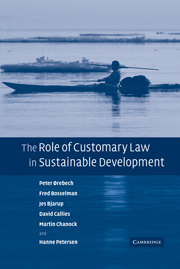Book contents
- Frontmatter
- Contents
- Preface
- Acknowledgements
- Table of cases
- List of international conventions
- Introduction
- 1 The linkage between sustainable development and customary law
- 2 Three case studies from Hawaii, Norway and Greenland
- 3 Social interaction: the foundation of customary law
- 4 How custom becomes law in England
- 5 How custom becomes law in Norway
- 6 Adaptive resource management through customary law
- 7 The place of customary law in democratic societies
- 8 Customary law, sustainable development and the failing state
- 9 Towards sustainability: the basis in international law
- 10 The case studies revisited
- 11 The choice of customary law
- 12 Conclusion: customary law in a globalizing culture
- References
- Index
- Authors index
12 - Conclusion: customary law in a globalizing culture
Published online by Cambridge University Press: 18 December 2009
- Frontmatter
- Contents
- Preface
- Acknowledgements
- Table of cases
- List of international conventions
- Introduction
- 1 The linkage between sustainable development and customary law
- 2 Three case studies from Hawaii, Norway and Greenland
- 3 Social interaction: the foundation of customary law
- 4 How custom becomes law in England
- 5 How custom becomes law in Norway
- 6 Adaptive resource management through customary law
- 7 The place of customary law in democratic societies
- 8 Customary law, sustainable development and the failing state
- 9 Towards sustainability: the basis in international law
- 10 The case studies revisited
- 11 The choice of customary law
- 12 Conclusion: customary law in a globalizing culture
- References
- Index
- Authors index
Summary
In this book we have tried to demonstrate the important role that customary law plays in modern, western society. We have explored the importance of sustainability and the search for legal systems that can provide cautious avenues for achieving sustainable objectives. And we have looked at the growing importance of international law's recognition of both sustainablility and custom. We have explained that customary law is an alternative to “governmental control and command.”
The importance of customary law
In order to understand the role of customary law today, we need to reemphasize some basic philosophical principles. We must acknowledge that humans have the capacity to formulate rules to guide cooperative behavior relating to each other and to their surrounding environment. We need to emphasize that customs are not simply reflex responses to outside stimuli, but are developed intuitively by humans who seek to benefit by cooperation.
Enlightenment philosophers argued that this rationalist capacity distinguished humans from the other animals. Although modern science may blur the lines between humans and animals, and between rational and instinctive behavior, it remains unquestioned that humans surpass all other species in the extent of their ability to use rational processes to establish customary rules.
Customary law exists whenever people act as if they were legally bound to observe customary rules. No endorsement by any legislative, judicial or administrative body is needed to create customary law if people accept rules as the law. Customary law is pervasive in modern societies.
- Type
- Chapter
- Information
- The Role of Customary Law in Sustainable Development , pp. 445 - 450Publisher: Cambridge University PressPrint publication year: 2006

